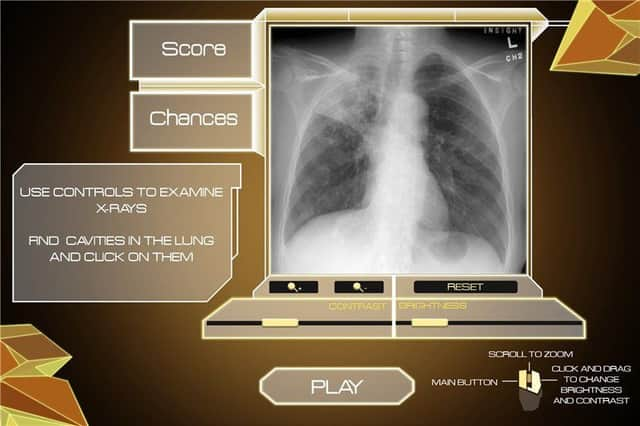Scottish scientists develop video game to fight TB


Experts from Abertay University and St Andrews University have developed the Project Sanitarium video game, where players become medics, using limited resources to tackle the disease on a global scale.
The game aims to raise awareness of the scale of the illness, which has developed resistance to many drugs and which kills someone every 20 seconds, as well as testing a mathematical model developed by experts from St Andrews University, which uses data from human interactions to simulate a virtual drug trial.
Advertisement
Hide AdAdvertisement
Hide AdInformation collected during the game will be fed back to the team of scientists.
It is hoped that it could help to shape the way they deliver drug treatments to the developing world more quickly and cheaper than before.
John Brengman, student producer of Project Sanitarium, said: “The scale of the global tuberculosis pandemic is absolutely terrifying but there’s still very little awareness about this disease.
“You have as much chance of surviving Ebola without treatment as you do of surviving tuberculosis with treatment.
“We want to use games technology to help tackle this massive problem, through raising awareness and helping test the scientists’ mathematical model.”
The model aims to predict how the disease spreads and inform the design of future clinical trials, saving time and money.
Professor Stephen Gillespie, of St Andrews University, who led the team which created the mathematical model, said: “Tuberculosis is a disease that is still killing more than a million people a year.
Advertisement
Hide AdAdvertisement
Hide Ad“Part of the problem is that there is stigma associated with the disease and many people do not seek treatment.
“Once diagnosed, a lot of patients feel better long before it is safe for them to stop treatment and so the disease may come back and may become resistant to antibiotics.”
He added: “By developing Project Sanitarium into an effective teaching tool for the public and health professionals we can demystify the disease and help more patients to complete their treatment and be cured.”
The game was developed by Radication Games, a team of undergraduate students at Abertay University, who plan to form a company when they graduate next year.
It involves making strategic choices about allocating resources to treat patients, as well as smaller arcade-style games which explore specific details such as how drug treatments work and how to read an X-ray.
The design for the full game includes an in-game economy based on the financial and time costs of treatments.
This could allow for charitable donations by players paying to buy more game currency.
Mr Brengman said: “It’s been fantastic to work with world-class scientists to create a completely new type of game, all focused on helping improve the lives of people with tuberculosis through raising awareness of the disease, improving our scientific understanding, and potentially supporting charity fundraising as well.”
Advertisement
Hide AdAdvertisement
Hide AdThe game is also powered by cloud technology so players can receive real-time updates on the virtual patients they are treating.
Project Sanitarium won Gold in the Healthcare category at the 2015 Serious Play Awards and third place in the Microsoft Azure Cloud Gaming Innovation Challenge.
Tuberculosis is a bacterial infection which mostly affects the lungs, although it can affect the glands, and the nervous system.
It is particularly prevalent in sub-Saharan Africa and southeast Asia.